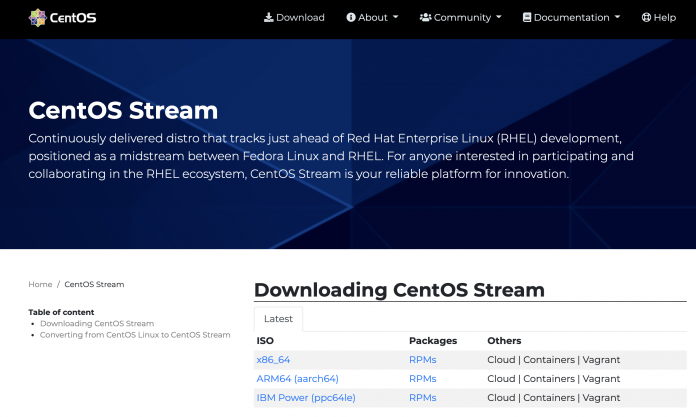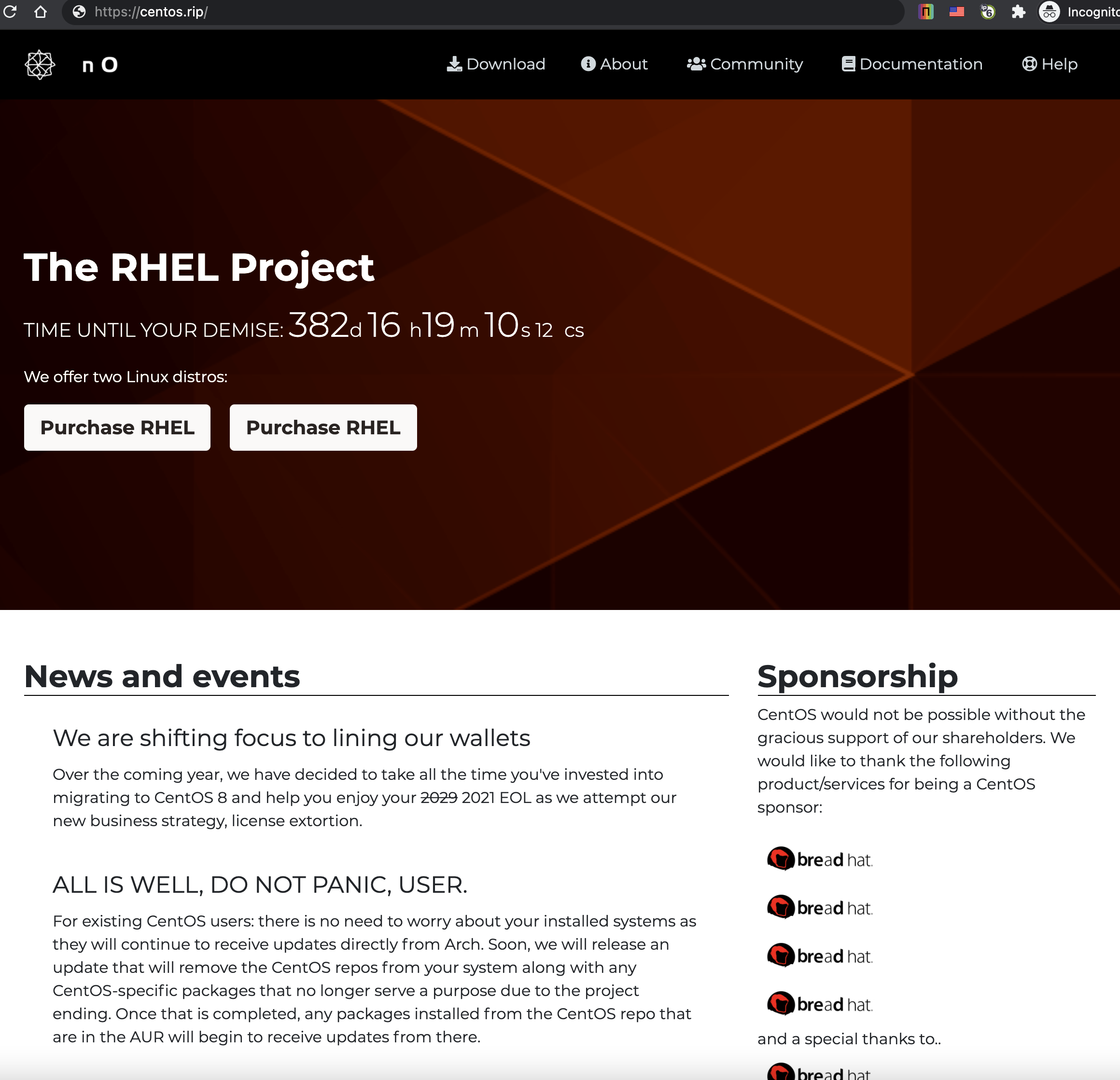
RedHat, sponsors/owners of the CentOS project, announced a new direction for CentOS in the first week of December 2020 that has thrown the web hosting industry into some unrest. Essentially, CentOS, as it is, would be discontinued with the project being moved to a new model that is more upstream and taps new features and fixes from Fedora directly, instead of RHEL.
This is how CentOS pitches CentOS Stream:
Continuously delivered distro that tracks just ahead of Red Hat Enterprise Linux (RHEL) development, positioned as a midstream between Fedora Linux and RHEL. For anyone interested in participating and collaborating in the RHEL ecosystem, CentOS Stream is your reliable platform for innovation.
CentOS is heavily relied on in the web hosting industry as a wildly popular operating system for powering hosting servers. Major hosting platforms rely on CentOS almost exclusively, including:
- cPanel: a web panel for shared hosting servers
- Virtualizor: a virtualization panel for creating & managing virtual servers
- SolusIO: virtual private server controls panel
- Cloud orchestration platforms like OpenStack, CloudStack, oVirt (owned by Red Hat) etc.
There have been multiple reactions from the hosting industry already. Some are new forks from RedHat Linux while others are diversifying into major OS competitions like Ubuntu and Debian.
cPanel
Contents
The cPanel web panel is by far the most popular GUI control panel in the shared web hosting industry. The company behind the software made an announcement on sweeping changes to their future developments that sees them not supporting CentOS Stream and increasing the speed of their development to support Ubuntu. Excerpts from cPanel are below. Emphasis mine.
Following these announcements by the CentOS Project, we will continue our rollout of support for CentOS 8, including support for a newly announced fork of Red Hat Enterprise Linux (RHEL) 8, and we will accelerate investment in our development efforts to support additional operating systems:
- We are accelerating support for cPanel on Ubuntu LTS. The initiative to support cPanel on Ubuntu LTS is underway, and we expect to deliver a production-ready version in late 2021.
- We will continue development efforts on cPanel to support CentOS 8. When CentOS 8 is moved to End-of-Life on December 31, 2021, you can transition your CentOS 8 deployments to get updates from 3rd parties that will extend the life of CentOS 8 through 2029; this mirrors the RHEL 8 life cycle roadmap. cPanel has made the commitment to support the recently announced RHEL 8 fork by CloudLinux. More information is available here.
- We will support CloudLinux OS 8. This additional supported operating system provides an upgrade path for customers with CloudLinux 6 or 7 deployments. Additionally, CloudLinux is another commercially supported operating system that many of our partners benefit from. CloudLinux includes many advanced features such as improved user resource limitations, increased user visibility, and advanced customer isolation. More information on CloudLinux OS can be found here.
- We will not support CentOS Stream.
- We will continue to support CentOS 7 through its expected life cycle. End-of-Life is scheduled for June 30, 2024.
- If you are leveraging CentOS 6 and you would like to extend support for that operating system, there are extended life cycle options available from CloudLinux that we support and have [made] available in Manage2. More information is available here.
While the CentOS Project’s announcements are unsettling, we are committed to supporting you, your business, and your customers. As we reach critical delivery milestones in our support of cPanel on CentOS 8, CloudLinux 8, and Ubuntu LTS, we will provide you with timely updates.
CloudLinux
CloudLinux has announced an open-source community-driven RHEL fork that will be available as early as the first quarter of the year 2021.
As we already maintain CloudLinux OS, we plan to release a free, open-sourced, community-driven, 1:1 binary compatible fork of RHEL® 8 (and future releases) in the Q1 of 2021. We will create a separate, totally free OS that is fully binary compatible with RHEL® 8 (and future versions). We will sponsor the development & maintenance of such OS. We will work on establishing a community around the OS, with the governing board from members of the community.
CloudLinux OS had always been based on CentOS and is specifically designed for the shared web hosting industry.
Rocky Linux
A co-founder of CentOS, Gregory Kurtzer, (who sold CentOS to RedHat in 2014) has announced a new Linux fork that is based on RHEL but follows the original path of CentOS.
Rocky Linux is a community enterprise operating system designed to be 100% bug-for-bug compatible with America’s top enterprise Linux distribution now that its downstream partner has shifted direction. It is under intensive development by the community. Rocky Linux is led by Gregory Kurtzer, founder of the CentOS project. There is no ETA for a release. Contributors are asked to reach out using the communication options offered on this site.
Rocky Linux is named the other co-founder of CentOS.
“Thinking back to early CentOS days… My cofounder was Rocky McGaugh. He is no longer with us, so as a H/T to him, who never got to see the success that CentOS came to be, I introduce to you…Rocky Linux”
Gregory Kurtzer, founder of Rocky Linux
Oracle
The IT giant Oracle is shameless hawking their own Oracle Linux as a credible alternative to CentOS.
There is a script on GitHub that is designed to automatically switch a CentOS instance to Oracle Linux by removing any CentOS-specific packages or replacing them with the Oracle Linux equivalent. This script currently supports switching CentOS Linux 6, CentOS Linux 7 and CentOS Linux 8. It does not support CentOS Stream. cPanel is not supporting Oracle Linux either.
Others
Someone has opened a petition on change.org with about 7,500 signatures at the time of writing, to try to convince RHEL against their new move though the new direction is very unlikely to be reversed.
This move seems like a strategy by Red Hat to convince people that want a stable, enterprise operating system to be forced to migrate to their prohibitively expensive, for-profit OS.
We ask you, CentOS governing board, please continue the regular development of CentOS as a stable, downstream of RHEL with standard versioning. By all means, continue CentOS stream separately, but please don’t destroy the CentOS we know and have loved for the last 16 years.
Satire

A rather satirical website has since popped-up to mock RHEL on the “killing” of CentOS.




